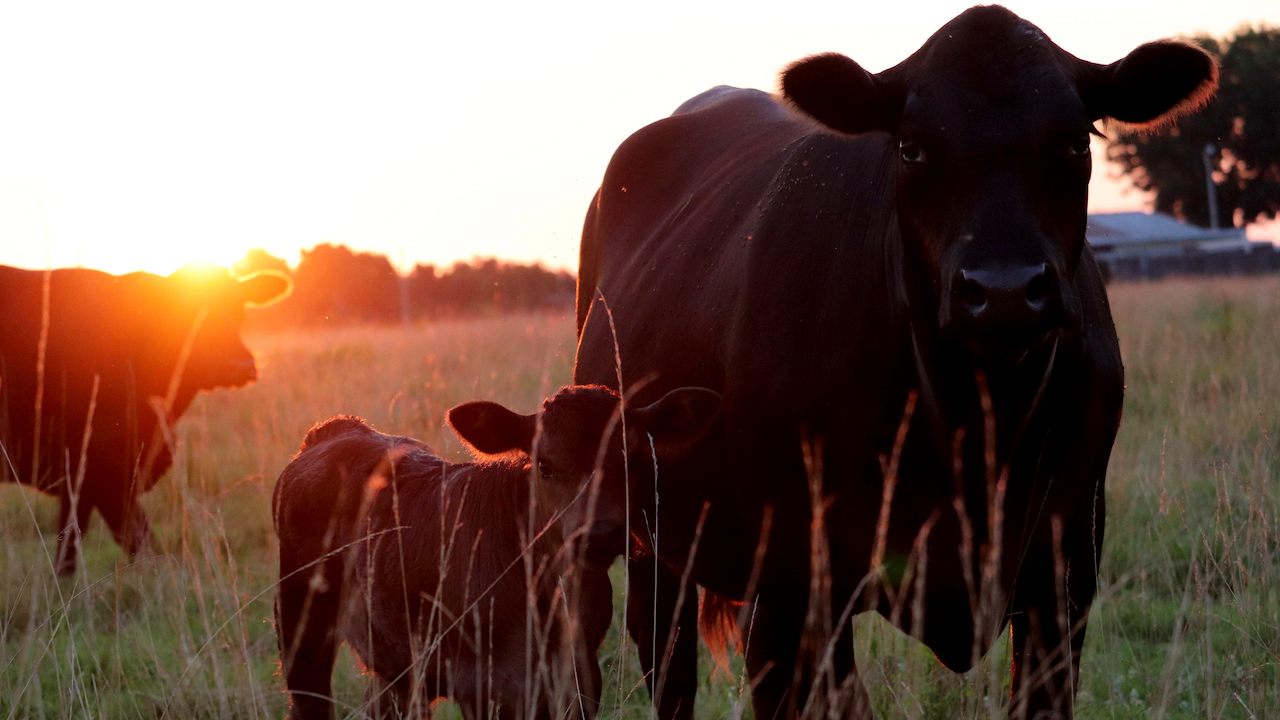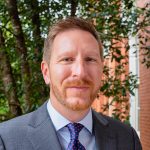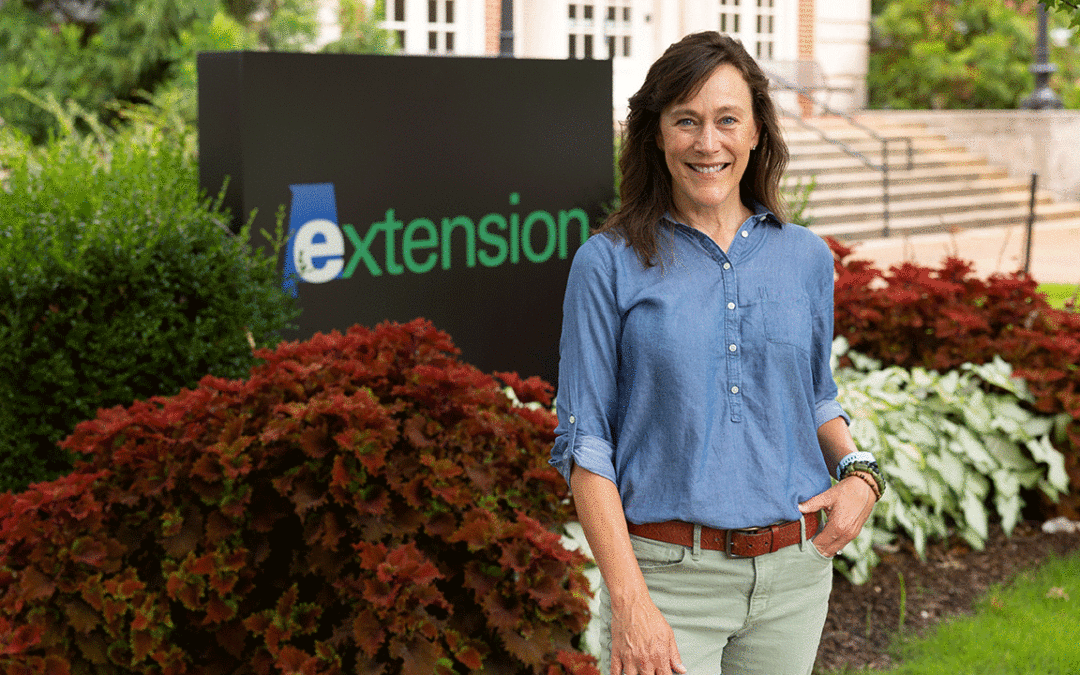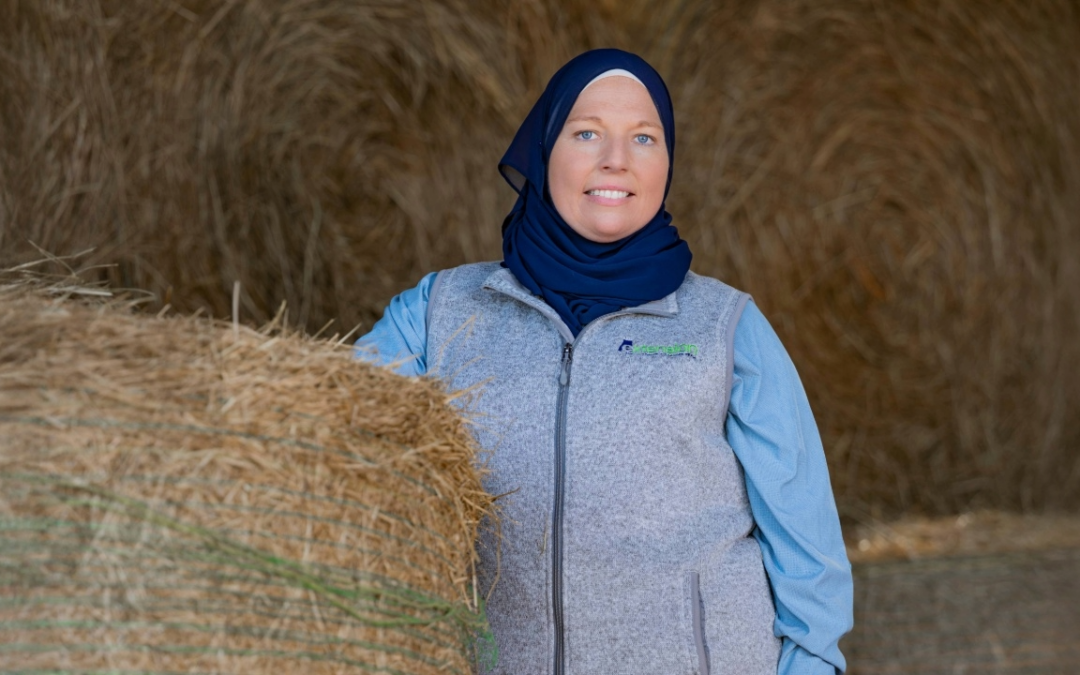Program made possible by $246,000 USDA-NIFA grant
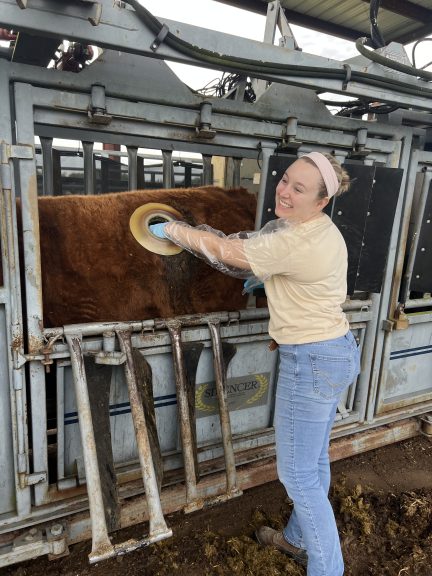
Animal sciences master’s student Ella Johnson works with a cannulated cow.
A College of Agriculture program for future leaders in the beef industry is entering its final academic year and taking stock of its impact. The highly selective National Needs Fellowship (NNF) prepared a dozen future leaders with interdisciplinary expertise in forage-based cow-calf production.
The program was developed with a $246,000 grant from the National Institute of Food and Agriculture, which primarily funded tuition and assistantships for students enrolled. The program was founded in 2022 with broad support from beef producers in Alabama, who will benefit from these talented individuals and their research.
“These students have extra special insights and capabilities that they would not have from a routine graduate program in any particular sub discipline of animal sciences,” said Don Mulvaney, associate professor of animal sciences and the grant team leader. “Students come out with a broader and deeper experience than they would have had.”
A traditional master’s program in animal sciences prepares students to be experts in a given sub-discipline, such as nutrition or reproduction. The NNF prepared students to solve problems where sub-disciplines meet. Each NNF fellow’s research incorporated two or more sub-disciplines to address a critical issue in beef production.
Fellows also rotated through several immersive experiences representing the 10-person grant team’s wide range of expertise: beef forages and systems thinking analysis; environment and sustainability; meat sciences and product dynamics, food safety; genomics and reproduction; and nutrition in the 21st century.
However, the program’s overarching goal was to prepare leaders and change agents in the beef industry. “This program is built around the common experience of leadership theory and practice,” said Mulvaney.
Through two required courses in advanced beef systems and scholarly leadership, fellows learned how to constructively deal with conflict, build professional relationships, analyze problems, work as a team and accept criticism in the workplace.
The fellows were also responsible for collaboratively planning and executing as a cohort an educational outreach and research conference for cattle producers.
“I wanted them to have the opportunity to build something,” said Mulvaney. “That being able to learn in real time what it means to pull something important off as a team.”
By combining leadership coursework with a real-world opportunity to practice team leadership in a tight-knit cohort, Mulvaney has created an opportunity for students to learn and grow in a way they would not typically get in a master’s program.
“It’s not just you with a professor [in your master’s program] working on research by yourself; it’s you and a group of people working together on projects outside your own disciplines,” said Ella Johnson, an animal sciences master’s student and fellow in the program.
Johnson, who is from outside Chicago, enrolled in the program in 2023. Her extended family farms in central Illinois, but she didn’t have any animal agriculture experience until she got to college. She applied to the program after learning about it in a careers newsletter email while an undergraduate at Purdue University.
She says she has grown as a leader in her first year in the program, particularly when it comes to relinquishing control and letting others play to their strengths.
“I’ve definitely strengthened some skills,” she said. “Group projects usually aren’t everyone’s favorite, but I’m learning to better navigate the situations where I work with people who are very different from me, both in terms of personality and experience.”
Johnson’s research interest is the knowledge gap between producers and consumers — and between scientists and consumers — and how communication can bridge those gaps. Her research project focuses on how cattle producers and consumers perceive the concept of sustainability in beef production.
“You can come up with all of these great scientific answers, but if the people who are raising the cattle don’t understand it — or don’t buy into it — then it’s not something that could actually work…” she said. “Similarly, on the consumer side of things… the beef industry is full of fantastic people and research and innovation, but it is usually far removed from the consumer—the point is there is a need to get everyone on the same page, we just need to figure out how.”
A sense of community is also central to the NNF. Mulvaney drew on his experience creating signature programs for Auburn University’s faculty development initiative, the Biggio Center, where he was associate director. The result has been a tight-knit group of students who not only are good friends, according to Johnson, but also are encouraged to help with each other’s research.
“My friend will say, ‘I’m going to the beef unit to pull rumen fluid off the cannulated cows; do you want to come?’ and I’m like, ‘Absolutely!’” said Johnson. “I have this picture of me with the canulated cows, and I’m just grinning. My work isn’t as exciting as being out with the animals, but my classmates are always willing to help me out by filling out my surveys or critiquing my deliverables.”
The program’s focus on forage-based cow-calf production is also an innovation. Half of all farms in the Southeast have cattle, mostly pastured on forage, according to Mulvaney. A major cost of raising a calf to weaning is supplemental feeds, which have dramatically increased in price in recent years. Better forage management can simultaneously make cattle producers more profitable and more environmentally sustainable.
“If we can improve efficiency, we can improve sustainability,” Mulvaney said.
Though the program is drawing to an end in 2025, its impact on the Department of Animal Sciences will last. Mulvaney believes the program’s spirt of collaboration and working across disciplines on research has “permeated beyond the cohort.”
“I think it has impacted the culture, and it’s embraced by some of the faculty that have been involved,” said Mulvaney.
Other animal sciences research and extension faculty involved in this project were: Werner Bergen (retired), Terry Brandebourg, Leanne Dillard, Wellison Diniz, Paul Dyce, Wayne Greene, Kim Mullenix, Russ Muntifering (retired), Soren Rodning, Jason Sawyer and Brandon Smith. Members of cohort 1 were: Anna Holliman, Karen Hiltbrand, Katie Corbitt, Rachel Hollingsworth, Nick Kertz, Elli Zorn. Members of cohort 2 were: Cody Brown Audrey Craner, Ashlyn Hurst, Ella Johnson, Brooke Newell and Diva Rigney.

